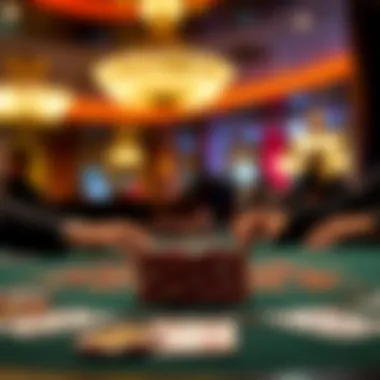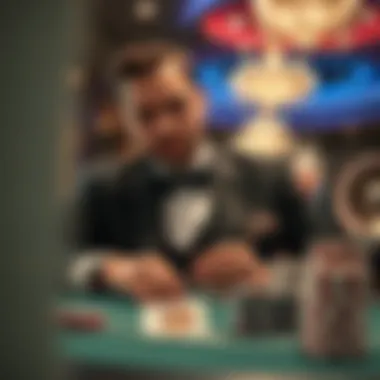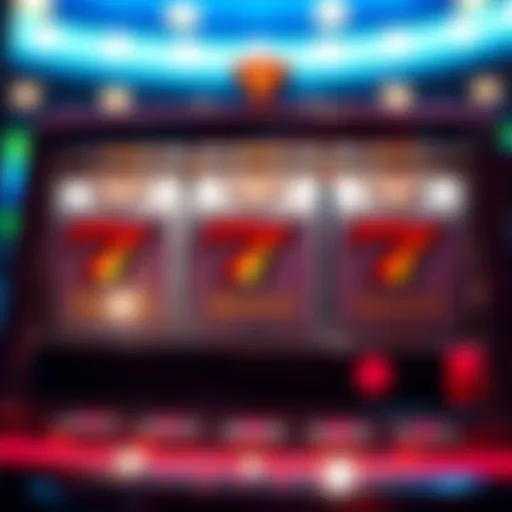Mastering Basic Blackjack: Rules and Strategies


Intro
When it comes to the world of casino games, blackjack stands as a classic, revered by both novices and seasoned gamblers alike. The essence of this game lies not only in the thrill of chance but also in the strategic depth that can be explored. The allure of blackjack is its combination of simplicity in rules and complexity in play strategies. This article aims to guide you through these fundamental aspects, equipping you with the necessary knowledge to make informed decisions at the table.
You might find blackjack at almost any casino, whether online or brick-and-mortar, bustling with both excitement and intensity. For those new to this captivating card game, understanding the basic rules is just the starting point. Knowing how to play is one thing, but truly grasping the underlying strategies can elevate your gameplay to a whole new level.
In the following sections, we will dive into the essential rules, strategic approaches, and some variations that define basic blackjack. This guide will not just cover the A-Z of how to navigate the game— it will encourage a more profound appreciation for its intricacies. Whether you're hoping to improve your gameplay or simply wish to understand the mechanics better, the information laid out here will serve as a comprehensive resource.
As we dig deeper, we’ll also brush upon common mistakes novice players make and how to avoid them, allowing you to sidestep the learning curve that many experience. We'll review popular casino games, analyze effective betting strategies, and explore advanced techniques, paving the way for a more rewarding blackjack experience.
As such, buckle up—it’s time to shuffle the deck and delve into the fascinating world of blackjack.
Foreword to Blackjack
Blackjack is more than just a card game; it’s a rich tapestry of strategy, psychology, and, of course, luck. The Introduction to Blackjack sets the stage for understanding not just how to play, but why thousands of players flock to this game year after year. Here, we’ll explore the magic behind the green felt tables and the allure of chasing that elusive 21.
Understanding the significance of this topic primes players to appreciate the game on a deeper level. Even novice players will find value, as they learn the mechanics and history that shape the game today. Skilled players can brush up on their fundamentals, perhaps uncovering insights they overlooked in their eagerness to win big.
In a world bustling with various gambling options, Blackjack stands out due to its blend of chance and skill as well as its low house edge compared to other casino games. This makes it appealing for both casual players and high rollers alike. Not only does the game allow for strategic depth, but it also cultivates a space for social interaction, which heightens the gaming experience.
With that being said, let’s peel back the curtain on the history of this classic game.
History of Blackjack
The roots of Blackjack can be traced back to the 17th century, primarily emerging in French casinos under the name "Vingt-et-Un," which translates to "Twenty-One." The game's journey across borders has led to numerous adaptations, but the fundamental objective remains more or less unchanged. According to sources from Britannica
As the game made its way to the United States, some interesting twists emerged that led to the version we recognize today. The gambling landscape in the U.S. offered an opportunity for casinos to tweak rules to attract players. One such tweak was offering players a bonus payout if they managed to get an Ace of Spades and a black Jack—thus the name Blackjack.
"To win at Blackjack, one must master the intricate dance of luck and strategy, a skill honed through the annals of gaming history."
This evolution illustrates not just a shift in rules but also a reflection of cultural influences on gambling. Each new locale brought unique flavors to the game, from special side bets to new payout schemes, cementing Blackjack as a social staple in various settings.
Objective of the Game
At its core, the objective of Blackjack is straightforward: players aim to have a hand value closer to 21 than that of the dealer, without exceeding it. While simplicity in the objective is appealing, the path to achieving it requires understanding of the game’s mechanics and strategic decisions.
Players begin the game with two cards dealt face up, while the dealer has one card face up and one card face down (the hole card). Here’s the thing: the player’s choices and the ensuing gameplay dynamics often dictate outcomes more than pure luck.
To clarify how the goals translate throughout the game:
- Achieve a hand total of 21 with the first two cards dealt (Blackjack).
- Beat the dealer's total without exceeding 21.
- Make clever plays such as hitting, standing, or doubling down based on the hand values.
Strategic positioning not only contributes to winning, but also makes the game intellectually stimulating. This blend of chance and thoughtfulness keeps players returning, trying to master the craft.
With these foundational elements in mind, one is now better equipped as we journey into the more intricate rules of the game.
Understanding the Rules
Grasping the rules of blackjack is akin to learning the ropes in a dance; without knowing the steps, one risks stumbling through the lively rhythm of gameplay. Understanding the rules allows players to navigate the game with confidence, enhancing both enjoyment and chances of success. This section covers essential aspects of the game’s structure, card values, and gameplay mechanics, serving as a foundation for effective engagement at the table.
Basic Game Structure
At its core, blackjack is played with one or more standard decks of 52 cards, where players compete against the dealer. The goal? Get as close to 21 as possible without exceeding it.
- Setup: The game typically begins with players placing their bets in designated areas on the table.
- Dealing Cards: Each player, along with the dealer, is dealt two cards. Players usually receive their cards face up, while one of the dealer’s cards is face down, keeping the suspense alive.
- Game Progression: Players take turns making decisions based on their hands and the dealer’s visible card. The options include:
- Hit: Draw an additional card, aiming to improve the total.
- Stand: Keep the current hand.
- Double Down: Double the bet after receiving the first two cards and draw one more.
- Split Pairs: If the first two cards are of equal value, they can be split into two separate hands.
"Understanding the basic structure not only empowers player decisions but also sets the stage for deeper strategy considerations later on."
Card Values
An essential facet of blackjack is familiarizing with how the cards value contributes to gameplay decisions. Here’s a breakdown:
- Number Cards (2-10): These hold their face value.
- Face Cards (Jack, Queen, King): Each is worth 10 points.
- Aces: These are flexible. They can count as either 1 or 11, depending on which is more favorable for the player’s total.
Knowing how to calculate the values swiftly can be a game-changer. It’s not just about adding numbers; it’s also about strategizing based on your current hand and the dealer's visible card.


Gameplay Mechanics
Once players understand the structure and card values, they move to the more nuanced gameplay mechanics. This stage delineates how the game plays out after the initial round of card dealing:
- Player Decisions: After assessing their cards, players manage actions that can swing the tide in their favor. Choosing when to hit or stand, making well-timed splits or double downs, is critical. Each choice can substantially alter the outcome.
- Dealer's Turn: After all players have completed their hands, the dealer reveals their face-down card. The dealer must follow specific rules that govern their play, typically hitting until reaching 17 or higher.
- Determining Winners: At the end of the round, the hands are compared. Players win if their total is closer to 21 than the dealer's without going bust (exceeding 21).
By grasping these fundamentals, players can immerse themselves in the action, making informed and strategic decisions rather than relying solely on luck.
Blackjack Strategies
Delving into blackjack strategies is what sets the stage for savvy players looking to swing the odds in their favor. The importance of mastering these strategies cannot be overstated, as they fundamentally shape how players react to the dynamic situation at the table. Understanding the basic principles and nuances of blackjack strategies is essential for both novices hoping to learn the ropes and seasoned veterans aiming to sharpen their skills. It is like having a map in an unfamiliar terrain, guiding you through decisions that could either lead to losses or wins.
Basic Strategy Overview
The basic strategy serves as the backbone of effective play in blackjack. It’s a blueprint that allows players to make the most statistically informed decisions based on their hand and the dealer's visible card. More than just guesswork or intuition, basic strategy springs from a wealth of statistical analysis that evaluates the probabilities of winning under various conditions.
A typical basic strategy chart outlines when to hit, stand, double down, or split pairs, providing players with a clear guide for each scenario they may encounter. The fundamental idea here is to minimize the house edge, which usually hovers between two and three percent with the proper application of basic strategy. Here’s a snapshot of what basic strategy encompasses:
- When to Hit: If your hand totals 11 or less, always hit.
- When to Stand: A hand totaling 17 or more should typically be a stand.
- Doubling Down: When your two cards total 10 or 11, doubling down can yield favorable outcomes.
- Splitting Pairs: Always split aces and eights, but never split tens or fives.
Mastering these points doesn’t lead to instant victory, but it certainly lays a strong foundation for informed decision-making at the table.
Key Decisions: Hit or Stand
Every blackjack hand boils down to two pivotal decisions: hit or stand. This choice can drastically affect your odds of winning. Understanding when to take a card and when to hold your ground shapes your overall success in a game.
The decision to hit often stems from a player’s hand value in relation to the dealer’s upcard. If the dealer shows a 6, often referred to as a weak card, players might be tempted to stand on lower totals. Conversely, if the dealer has an ace exposed, a more aggressive stance is usually warranted because the dealer stands a good chance of achieving a strong total.
Additionally, players should be mindful of their own hand's composition. A soft hand, one including an ace counted as 11, allows for more flexibility compared to a hard total, which limits risk. In short, the hit or stand decision boils down to an assessment of risk versus reward, influenced by not just your total, but the dealer’s hand too.
Doubling Down and Splitting Pairs
Doubling down and splitting pairs are advanced maneuvers that require a good grasp of basic strategy, but they can significantly enhance your success when executed correctly. Doubling down allows players to double their initial bet in exchange for receiving just one additional card—this can be lucrative in favorable conditions.
To decide whether to double down, consider your hand total along with the dealer’s visible card. For example, if you have a total of 11 against a dealer's lower card like a 4, doubling down can maximize your potential payout. Here are some common situations that favor doubling down:
- Total of 9, 10, or 11 against a dealer’s weaker card (2 through 6).
- When the dealer has an up card of 4, 5, or 6, increasing the chances that they’ll bust.
On the other hand, splitting pairs is another strategy designed to maximize winnings when the cards allow. If you’re dealt two cards of the same value, splitting gives you two chances to win. Yet, there’s a strategy to it:
- Always split aces and eights.
- Never split tens or fives, as those present strong totals.
With these strategies at hand, players can cautiously navigate through the risks and excitement of blackjack, sharpening their skills while fostering a deeper understanding of the game’s intricacies.
To truly excel, ongoing practice in different scenarios is key. Familiarize yourself with the basic strategy, and adapt your gameplay to the dynamics of the table.
For further reading and resources, players might consider:
Betting in Blackjack
Betting is at the heart of blackjack, impacting not only your potential winnings but also your overall approach to the game. It’s crucial to grasp various betting elements to enhance your strategy and prevent common pitfalls. Each dollar placed on the table represents a decision, one that can shift the tides of your gaming experience from thrilling to regrettable in a heartbeat. The way you manage your bets fundamentally influences how you play, and consequently, how well you perform.
Understanding Betting Limits
Each casino, whether brick-and-mortar or online, has set betting limits. Understanding these limits can give you a tactical upper hand. Typically, there are minimum and maximum bets, which can vary widely from one table to another. A player should always check the table limits before diving in. For instance, if you fancy yourself a high roller, finding a table with a higher limit is essential; conversely, beginners might prefer starting at tables with lower limits to minimize risk.
Essential Tip: Finding a table that suits your bankroll is as important as the game itself. Playing below your comfort limit can be just as detrimental as going overboard.
You also need to consider your strategy regarding betting progression. Here are a few pointers:
- Flat betting: Keeping your bets constant can help manage your bankroll effectively.
- Progressive betting: This method involves increasing your stake after winning rounds. While this can lead to significant payouts, it can equally spell disaster if loses accumulate.
- Martingale strategy: Involves doubling your bets after a loss to recover lost funds, but beware, it can dry out your funds quicker if you go on a losing streak.
Understanding these limits not only shapes your overall experience but builds a solid foundation for smart betting. A keen awareness of your environment can lead to more informed decisions.
Insurance Bets Explained
Insurance bets are often touted as a safety net for players, yet they come with their share of risks and rewards. If the dealer’s up card is an Ace, you may be offered insurance to protect yourself against a potential blackjack. Typically, this insurance bet costs half your original wager and pays 2:1 if the dealer does have Blackjack. So, while it seems appealing, consider the odds.


Here’s why many seasoned players advise against it:
- The odds are not in your favor over the long run. Statistically, the dealer will have blackjack about 31% of the time when they show an Ace.
- It can be tempting to take insurance, especially after a couple of wins, but it tends to eat away at your bankroll in the long term.
In essence, take insurance bets only if you feel an exceptionally strong hunch, but don't let emotion cloud your judgment on this one.
Side Bets and Their Risks
In blackjack, side bets are like shiny baubles that attract players but often come with substantial strings attached. These bets, such as Perfect Pairs or 21+3, usually feature higher payout rates than a standard bet but usually come with lower probabilities of winning.
- Perfect Pairs: This bet allows players to wager on whether their first two cards will form a pair. Payouts can be enticing but remember, the chances of landing that pair aren’t stellar.
- 21+3: This bet combines the player’s first two cards with the dealer's upcard, merging aspects of poker for potential high payouts. As thrilling as it may sound, underestimating the risks can lead to quick losses.
Side bets can seem alluring due to the high odds, but tread carefully; they generally increase the house edge significantly.
It's crucial to evaluate the risks before taking the plunge into side bets. While they may offer a thrilling diversion, they can chip away at your bankroll faster than you'd expect. Stick to the fundamentals, and use side bets sparingly.
Common Mistakes to Avoid
In the game of blackjack, as in life, a single misstep can lead to costly errors. This section aims to shed light on some of the most common pitfalls players encounter. Understanding these mistakes can enhance the experience and potentially increase the chances of success at the table. It�’s not just about playing the cards—it's about playing the game with finesse and awareness. Here are some mistakes to watch out for:
Ignoring Basic Strategy
One of the biggest blunders a player can make is dismissing the basic strategy. This strategy is a mathematically derived guide that outlines the best moves based on the player's hand and the dealer's upcard. A common misconception is that one can operate on gut feelings or personal strategies. However, throwing caution to the wind often leads to suboptimal decisions and unnecessary losses.
- Lack of Consistency: Players who ignore the basic strategy might find they often stray from optimal plays. For instance, if you have a hand totaling 16 and the dealer shows a 7, the basic strategy advises hitting. Going against this might result in busting, and that could break the bank.
- Emotional Play: When the strategy is placed on the back burner, emotions take the driver's seat. Whether it's excitement after a big win or frustration after a loss, players can easily deviate from the safest path.
By familiarizing oneself with basic strategy charts, one equips themselves with a powerful weapon against the house edge.
Chasing Losses
Chasing losses is another trap many fall into. After last-hand losses, the instinct to retrieve those lost chips can drive players to make hasty, emotion-driven bets. The mindset, though tempting, can lead only to deeper losses.
- The Gambler’s Fallacy: Players might think that the results of past hands influence the next round. For example, if one has lost three consecutive hands, they may feel that they are "due" for a win. This logic is flawed, as each hand is independent.
- Higher Stakes: In pursuit of recovering losses, players often increase their bets. This could strip away the bankroll faster than one could imagine. A steady, well-considered approach is key.
Avoiding the urge to chase losses necessitates discipline and a clear understanding that losses are part of the game.
Over-Betting the Bankroll
Bankroll management is the backbone of any successful blackjack strategy, yet many players falter here. Over-betting one’s bankroll, meaning wagering too much of it in a single session, can spell disaster.
- Setting Limits: Players should establish a clear limit before they start playing. This includes setting aside a specific amount of money rather than gambling with funds intended for essentials.
- Dividing the Bankroll: A good practice is to divide the bankroll into smaller portions for each session. If you walk into a casino with $500, it might make sense to only risk $100 for that evening and leave the rest untouched.
By prioritizing smart betting and knowing when to walk away, players can extend their time at the tables while minimizing financial pitfalls.
Every player has the potential to improve. It’s the awareness of mistakes that paves the way to better strategies and gains.
In summary, recognizing and mitigating these errors is fundamental to enjoying and excelling in blackjack. The game offers thrills and challenges, but with a clear head and a solid strategy, players can navigate through it successfully. For further reading, consider checking resources like Wikipedia's Blackjack page or Britannica for in-depth information and strategies.
Variations of Blackjack
Understanding the variations of blackjack is crucial for any player wishing to hone their skills or gain a competitive edge. Each variation comes with unique rules and strategies that can significantly impact gameplay. By familiarizing oneself with these differences, players can adapt to different environments, be it in a casino or online, ensuring they have a strategy that fits the specific game they're engaging with.
European vs. American Blackjack
One of the most glaring differences between European and American blackjack lies in the rules regarding the dealer’s cards. In European blackjack, the dealer only receives one card face up initially, revealing the second card only after players have made their decisions. Thus, players only have partial information when making bets, heightening the game's suspense.
In contrast, American blackjack has both of the dealer's cards visible to players. This full disclosure offers a more strategic outlook, allowing for informed decisions by the players. The betting limits can also differ, with European tables generally having a quaint ambiance that might attract a different crowd compared to the bustling American casinos.
Progressive Blackjack and Its Features
Progressive blackjack is another intriguing variant that incorporates a side bet linked to a jackpot that increases over time. In this form, players can win substantial payouts if they hit specific hands, such as a suited blackjack or a certain combination of cards. This interactive layer adds excitement, allowing you to not only focus on the standard game but also heightens your prospects of landing a windfall.
However, one must approach this variant with caution. The odds can shift slightly in favor of the house, so understanding the underlying mechanics before diving in is wise. Players must also consider their bankroll management carefully, as progressive bets can vary significantly from table to table.
Online Blackjack vs. Live Dealer Blackjack
The rise of technology has ushered in two significant modes for playing blackjack: online and live dealer options. Online blackjack often utilizes a random number generator to ensure fairness. Players can enjoy the game at their own convenience, sometimes with less pressure than at a live table.


On the other hand, live dealer blackjack offers a more immersive experience. With live dealers and real-time gameplay streamed directly to your device, it mimics the physical casino vibe almost perfectly. Players can chat with dealers and other participants, fostering a community atmosphere. Both versions have their merits, but choosing one depends on personal preference—whether you favor the ease of playing anytime or the social interaction typical of a brick-and-mortar establishment.
In summary, understanding the variations of blackjack not only broadens your knowledge but enriches your gameplay experience, making you a more adept player no matter where you find yourself.
For further information about blackjack variations, you can check out Wikipedia, or visit Britannica.
Engaging with forums on platforms such as Reddit can also provide anecdotal experiences and tips from other players.
The Psychology of Playing Blackjack
In the world of blackjack, understanding the mental aspects of the game can be just as vital as knowing the rules and strategies. The psychology of playing blackjack encompasses how players make decisions, manage their emotions, and interact with others at the table. These elements can significantly influence outcomes, shaping not only personal experiences but also influencing overall game dynamics.
Recognizing the psychological factors at play can lead to better decision-making and enhance the gambling experience. The stakes in blackjack are not only financial; they're also tied to emotions, self-control, and sometimes even ego. By acknowledging how psychology affects gameplay, players can become more adept and engaged.
Understanding Player Behavior
Player behavior at the blackjack table is a tapestry woven with different threads—each individual brings their own history, strategies, and perceptions to the game. Various factors can influence how players act, including their previous experiences with gambling, their personality traits, and their current emotional state.
- Risk Tolerance: Some people thrive in high-pressure situations, eagerly placing larger bets, while others might hesitate, favoring safer bets. Risk tolerance can impact how a player decides to hit, stand, or even double down.
- Social Dynamics: The atmosphere at the table matters too. A friendly, relaxed vibe might encourage more open play and discussions among players, while a tense environment might lead to more conservative gameplay or conflicts.
- Incentives: Certain players might be playing for money, while others engage for the thrill of the game. Understanding motivations is crucial; not everyone sits at the table for the same desired outcome.
Awareness of these behaviors allows players to read the table, which can influence their own strategy. For instance, if one notices a fellow player consistently making aggressive bets, they might choose to adopt a more cautious approach or vice versa.
Managing Emotions at the Table
When you're sitting at a blackjack table, emotions can be your best friend or worst enemy. The highs from winning can lead to a feeling of invincibility, while losses may induce panic or frustration. This emotional rollercoaster can distort judgment and lead to poor decisions.
- Keeping Composure: Successful players often emphasize the importance of maintaining a cool head. Recognizing when excitement is influencing decisions can lead to a more rational approach. A deep breath or a short break can help in resetting thoughts and reactions.
- Self-awareness: Players should regularly check in with themselves. If worries about finances loom large, or if feeling particularly elated after a win, it might be time to step back. Sometimes, the best move is choosing not to play, particularly when emotions are at a high tide.
- Expectation Management: Setting realistic expectations can shield players from overwhelming emotional swings. Winning is the goal, but losses are part of the game too. Striking a balance between enjoyment and competitiveness is fundamental.
"In blackjack, your mindset can become as important as your hand strength. Master your thoughts, and the game will follow suit."
The psychology involved in playing blackjack adds layers of complexity and richness to the game. Gamblers, casino managers, poker players, and even hobbyists can all benefit from delving into these aspects. By recognizing patterns in one's own behavior and managing emotions, players enhance both their gameplay experience and their outcomes at the table. Resources such as Wikipedia and Britannica can provide deeper insights, while forums like Reddit often host lively discussions about strategies and experiences, enriching the broader conversation surrounding the psychological facets of blackjack.
Resources for Blackjack Players
Understanding the resources available to blackjack players can make a significant difference in their gameplay experience. Resources not only facilitate learning the game but also provide tools and insights that can sharpen skills and improve outcomes at the table. With the complexities involved in blackjack, having the right resources empowers both beginners and seasoned players to navigate its challenges with confidence and knowledge.
Some key elements to consider when looking for resources include effective learning materials, helpful applications, and community support. Effective resources break down intricate concepts into digestible formats, allowing players to fully comprehend and apply strategies. Online tools can simulate real-life gameplay scenarios, providing invaluable practice opportunities without the high stakes.
When diving into these resources, a player should also contemplate the credibility of the source. Reliable books and applications come from reputable authors or developers who have substantial experience. Community insights can often guide players in finding the best strategies while sharing personal experiences, challenges, and developed strategies.
"Knowledge is power at the blackjack table. Understanding the game’s intricacies gives players a distinct edge over others."
Books and Literature
Books are often the bedrock of knowledge for any blackjack player seeking to enhance their skills. There are numerous titles that cater to a wide array of skill levels, from fledgling enthusiasts just dipping their toes into the waters of blackjack to more experienced players looking to refine advanced tactics. Classics like Beat the Dealer by Edward O. Thorp or Blackjack Bluebook II by Fred Renzey serve as great starting points, offering fundamental strategies and insights to navigate the game.
Moreover, literature can introduce various strategies, giving readers a wider perspective on different styles of play. Theoretical discussions in books often cover mathematical probabilities and probabilities, making these reads crucial for those who want the upper hand. Other noteworthy mentions include Blackjack for Blood by Bryce Carlson, which offers more sophisticated strategies. It's not just about winning but understanding how to make informed decisions based on statistical concepts.
Some players may find literature on gambling psychology beneficial. Books focusing on mindset and behavior at the table can help players manage emotions and improve their decision-making process. Utilizing these resources can aid in realizing one's strengths and weaknesses, making a substantial difference during live gameplay.
Online Tools and Applications
With technology permeating nearly all areas of life, it stands to reason that online tools and applications have become central to mastering blackjack. Numerous apps are designed to offer practice scenarios, allowing players to engage in simulated games without risking actual money. For instance, apps like Blackjack 21 or Blackjack Trainer pave the way for hands-on experience, helping to perfect strategies and understand real-time consequences of decisions made during play.
Aside from practice apps, online calculators can help players determine probabilities, evaluate various situations, and analyze outcomes. These tools can significantly boost one’s understanding of how different deck compositions affect gameplay.
Communities on platforms such as Reddit and Facebook provide additional resources where players can exchange tips, ask questions, and learn from experienced individuals. Forums dedicated to gambling discussions create spaces for players to share insights, strategies, or even pitfalls to watch out for in their blackjack journey. Accessing such communal knowledge can sharpen one's own understanding and approach to the game considerably.
Finale
In wrapping up the insights we've shared about blackjack, it's vital to consider the broader implications of mastering this classic card game. Blackjack isn't merely about luck; it's a blend of strategy, psychology, and informed decision-making. Players who grasp the nuances of the game—such as the importance of basic strategy—can significantly improve their chances of success.
Recap of Key Points
To ensure clarity, let's summarize the critical elements:
- Rules and Mechanics: Understanding the basic rules and how the game is structured lays the foundation for better gameplay.
- Strategies: Employing basic strategies can vastly enhance a player’s potential, as seen in decisions like when to stand or hit, as well as the merits of doubling down and splitting pairs.
- Common Pitfalls: Being aware of common mistakes to avoid, such as ignoring established strategies or chasing losses, can protect not only your bankroll but also your overall enjoyment of the game.
- Variations and Psychology: Just as the game's variations offer new flavors of play, understanding the psychological elements—both from your perspective and that of others at the table—is paramount.
By keeping these aspects in mind, you position yourself as a more knowledgeable and confident player.
Final Thoughts on Mastering Blackjack
Learning is a journey, not a destination.
Every session at the table, whether it be a win or a loss, contributes to your overall mastery of blackjack. So stake your claim, play smart, and enjoy the game. It’s not just about the cards; it’s about how you play them.















